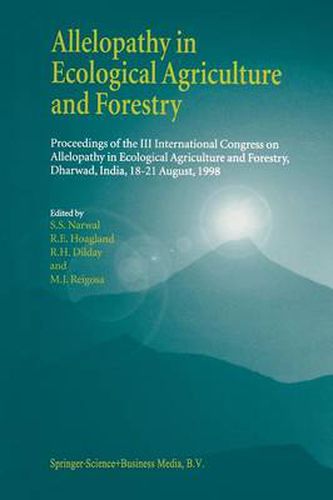Readings Newsletter
Become a Readings Member to make your shopping experience even easier.
Sign in or sign up for free!
You’re not far away from qualifying for FREE standard shipping within Australia
You’ve qualified for FREE standard shipping within Australia
The cart is loading…






This title is printed to order. This book may have been self-published. If so, we cannot guarantee the quality of the content. In the main most books will have gone through the editing process however some may not. We therefore suggest that you be aware of this before ordering this book. If in doubt check either the author or publisher’s details as we are unable to accept any returns unless they are faulty. Please contact us if you have any questions.
The rapidly growing human population has increased the dependence on fossil fuel based agrochemicals such as fertilizers and pesticides to produce the required agricultural and forestry products. This has exerted a great pressure on the non renewable fossil fuel resources, which cannot last indefinitely. Besides, indiscriminate use ofpesticides for pests (weeds, insects, nematodes, pathogens) control has resulted in serious ecological and environmental problems viz. , (A) Increasing incidence of resistance in pest organisms to important pesticides. (B) Shift in pests population, particulary in weeds and insects. In weeds, species that are more closely related to the crops they infest have developed. In insects, scenario is most grim, the predators have been killed and minor insect pests have become major pests and require very heavy doses ofhighly toxic insecticides for their control. © Greater environmental pollution and health hazards (a) particularly from contamination of surface and underground drinking water resources and (b) from their inhalation during handling and application. (D) Toxic residues of pesticides pollute the environment and may prove hazardous to even our future generations. (E) Some agricultural commodities may contain minute quantities ofpesticides residues, with long tenn adverse effects on human and livestock health. Therefore, serious ecological questions about the reliance on pesticides for pests control has been raised. The use of fertilizers, besides causing environmental problems has also impoverished the soil health and decreased the beneficial soil fauna. For example, in some major crop rotations viz.
$9.00 standard shipping within Australia
FREE standard shipping within Australia for orders over $100.00
Express & International shipping calculated at checkout
This title is printed to order. This book may have been self-published. If so, we cannot guarantee the quality of the content. In the main most books will have gone through the editing process however some may not. We therefore suggest that you be aware of this before ordering this book. If in doubt check either the author or publisher’s details as we are unable to accept any returns unless they are faulty. Please contact us if you have any questions.
The rapidly growing human population has increased the dependence on fossil fuel based agrochemicals such as fertilizers and pesticides to produce the required agricultural and forestry products. This has exerted a great pressure on the non renewable fossil fuel resources, which cannot last indefinitely. Besides, indiscriminate use ofpesticides for pests (weeds, insects, nematodes, pathogens) control has resulted in serious ecological and environmental problems viz. , (A) Increasing incidence of resistance in pest organisms to important pesticides. (B) Shift in pests population, particulary in weeds and insects. In weeds, species that are more closely related to the crops they infest have developed. In insects, scenario is most grim, the predators have been killed and minor insect pests have become major pests and require very heavy doses ofhighly toxic insecticides for their control. © Greater environmental pollution and health hazards (a) particularly from contamination of surface and underground drinking water resources and (b) from their inhalation during handling and application. (D) Toxic residues of pesticides pollute the environment and may prove hazardous to even our future generations. (E) Some agricultural commodities may contain minute quantities ofpesticides residues, with long tenn adverse effects on human and livestock health. Therefore, serious ecological questions about the reliance on pesticides for pests control has been raised. The use of fertilizers, besides causing environmental problems has also impoverished the soil health and decreased the beneficial soil fauna. For example, in some major crop rotations viz.